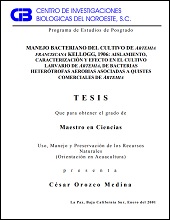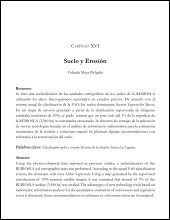Manejo bacteriano del cultivo de Artemia Franciscana Kellogg, 1906: aislamiento, caracterización y efecto en el cultivo larvario de Artemia, de bacterias heterótrofas aerobias asociadas a quistes comerciales de Artemia
Author
CESAR OROZCO MEDINA
Metadata
Show full item recordAbstract
"Bacterias asociadas a quistes de Artemia franciscana fueron identificadas en base a estudios fenotípicos y de análisis de secuencias de' bases de fragmentos del gen que codifica para el 16S rARN. Comparaciones de secuencias en el Banco de Genes del NCBI permitió identificar a las cepas CA9708L, CA9708R y CA9709V ser miembros del género Microbacterium y a las cepas CA9708N, CA9708T y CA9709AN pertenecer al género Exigllobacterium. Ambos géneros estan filogeneticamente relacionados y forman parte de la sección 15 del Manual Bergey de Bacteriología Sistemática denominada Bacilos irregulares Gram positivos no esporulados y también emparentado s con actinobacterias (Jones y Collins, 1986). Éste es el primer reporte de Microbacterium sp. y Exiguobacterium sp. aislados de cultivos de A. franciscana. NaupJios de A. franciscana fueron retados en cultivo monoxénicos con cepas de Microbacterium (cepas CA9708L, CA9708R), Exiguobacterium (cepa CA9708N) y Vibrio parahaemolyticus 588 (de la CECT) utilizando levadura (Saccharomyces cerevisiae) estéril como alimento. La cepa CA9708R y Vibrio parahaemo~vficus afectaron negativamente la sobrevivencia de Artemia. Las cepas CA9708L y CA9708N fueron inócuas para las sobrevivencia, crecimiento y desarrollo de Anemia, pero la mezcla de éstas dos últimas cepas bacterianas (cultivo dixénico) resultó con efecto positivo para el crecimiento y desarrollo de Artemia. Asi se propone que las cepas CA9708L y CA9708N son bacterias con potencial para ser utilizadas como agentes probióticos en el cultivo larvario de Artemia." "Associated bacteria to cysts of Artemia franciscana were identified based on phenotypic studies and sequences analysis of bases of gen fragments that codify the 16S rARN. Comparations of sequences in tne GenBank of the NCBI allowed to indentify the strains CA9708L, CA9708R and CA9709V as members of genera Microbacterium and strains CA9708N, CA9708T y CA9709AN to belong to the genera Exiguobacterium. Both genera are phylogenetically related and are includ in the secction 15 of Bergey´s Manual of Sistematic Bacteriology, named irregular, nonsporing Gram-positive rods, and related with Actinobacteria too (Jones y Collins, 1986). It is the firsth report of the Microbacterium sp. and Exiguobacterium sp. isolated of Artemia´s cultures. Nauplii of A. franciscana was challenged in monoxenic cultures with strains Microbacterium sp (strains CA9708L, CA9708R), Exiguobacterium sp (strains CA9708N) and Vibrio parahaemolyticus 588 (de la CECT) using yeast (Saccharomyces cerevisiae) sterile as food. The strains CA9708R and V. parahaemolyticus affected the survival of Artemia negatively. The strains CA9708L and CA9708N were harmless for the survival, growth and development of Artemia, but the mixture of these two bacterial strains (dixenic culture) they were with positive effect for the growth and development of Artemia. Therefore, its proposed that strains CA9708L y CA9708N are bacteria with potential for its use as probiotics agent in Artemia´s larval cultures."
Collections
Related items
Showing items related by title, author, creator and subject.
-
PROMOCIÓN DEL PERIFITON PARA EL CULTIVO DE CAMARÓN BLANCO: HACIA UNA ACUICULTURA ECOLÓGICA
DOMENICO VOLTOLINA LOBINA; JUAN MANUEL AUDELO NARANJO; MARIA DEL ROSARIO PACHECO MARGES -
Suelo y Erosión
YOLANDA LOURDES MAYA DELGADO


